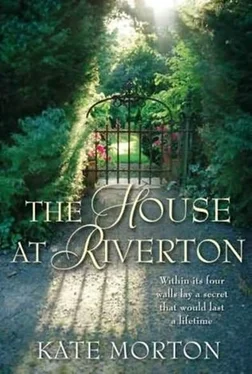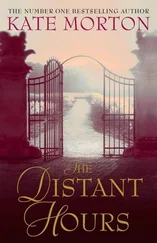The tour starts downstairs. The hub of any English country house, says Beryl with a practised smile and a wink. Ursula and I take a lift installed where the coat cupboard used to be. By the time we reach the bottom, the group is already crowded around Mrs Townsend’s kitchen table, laughing as Beryl reads through a comic list of traditional English dishes of the nineteenth century.
The servants’ hall looks much as it did, yet it is unaccountably different. It has lost its friendly, frowsty ambience. It’s the lighting, I realise. Electricity has swept away the flickering, whispering spaces. We were without for a long time at Riverton. Even when Teddy had the place wired in the mid-twenties it was nothing like this. I miss the dimness, though I suppose it wouldn’t do to keep it lit as was, even for historical effect. There are laws about that sort of thing now. Health and safety. Public liability. No one wants to be sued because a daytripper accidentally misses his step on a poorly lit staircase.
‘Follow me,’ chirps Beryl. ‘We’ll take the servants’ exit to the back terrace, but don’t worry, I won’t make you put on uniforms!’
We are on the lawn above Lady Ashbury’s rose garden. It looks, surprisingly, much as it always did, though ramps have been constructed between the tiers. They have a team of gardeners now, says Beryl, employed continuously on grounds maintenance. There’s a lot to look after: the gardens themselves, the lawns, the fountains, other various estate buildings. The summer house.
The summer house was one of the first changes Teddy made when Riverton fell to him in 1923. It was a crime, he said, that such a beautiful lake, the jewel in the estate, had been allowed to fall to disuse. He envisaged boating parties in the summertime, planetary-observation parties in the evenings. He had plans drawn immediately and by the time we came from London in April 1924 it was almost complete, the only hold-ups a tardy shipment of Italian limestone and some spring rain.
It was raining the morning we arrived. Relentless, drenching rain that started as we drove through the outer villages of Essex and didn’t let up. The fens were full, the forest soggy, and when the motor cars crawled up the muddy Riverton driveway, the house wasn’t there. Not at first glance. So shrouded was it by low-lying fog that it only appeared gradually, as if an apparition. When we drew close enough, I wiped the palm of my hand against the misty motor-car window and peered through the cloud toward the etched glass of the nursery window. I had an almost overwhelming sense that somewhere inside that great dark house Grace of five years ago was busy preparing the dining room, dressing Hannah and Emmeline, receiving Myra’s latest wisdom. Here and there, then and now, simultaneously, at the capricious whim of time.
The first motor car stopped and Mr Hamilton materialised from the front portico, black umbrella in hand, to help Hannah and Deborah alight. The second car continued on to the rear entrance and stopped. I attached my raincoat to my hat, nodded to the driver and made a run for the servants’ hall entrance.
Perhaps it was the fault of the rain. Perhaps if it had been a clear day, if the sky had glittered blue and sunlight had smiled through the windows, the house’s decline would not have been so shocking. For though Mr Hamilton and his staff had gone to their best efforts-had been cleaning around the clock, said Myra-the house was in poor condition. It was a tall order to make up so promptly for years of Mr Frederick’s determined neglect.
It was Hannah who was most affected. Naturally enough, I suppose. Seeing it in its demoralised state brought home to her the loneliness of Pa’s last days. Brought back, too, the old guilt: her failure to mend the bridges between them.
‘To think he lived like this,’ she said to me that first evening as I readied her for bed. ‘All the while I was in London and I didn’t know. Oh, Emmeline made jokes every so often, but I never for a minute imagined…’ She shook her head. ‘To think, Grace. To think of poor old Pa being so unhappy.’ She was silent for a moment then said, ‘It goes to show, doesn’t it, what happens when a person isn’t true to their own nature?’
‘Yes, ma’am,’ I said, unaware that we were no longer speaking of Pa.
Teddy, though surprised by the extent of Riverton’s decline, was not perturbed. He had planned a full renovation anyway.
‘Just as well to bring the old place into the twentieth century, eh?’ he said, smiling benevolently at Hannah.
They’d been back a week by then. The rain had cleared and he was standing at one end of her bedroom, surveying the sunlit room. Hannah and I were sitting on the chaise longue, sorting through her dresses.
‘As you like,’ was her noncommittal answer.
Teddy looked at her, his face a sketch of bewilderment: wasn’t it exciting to restore her ancestral home? Didn’t all women relish the opportunity to put their feminine stamp on a place? ‘I’ll spare no expense,’ he said.
Hannah looked up and smiled patiently, as one might at an overeager shop assistant. ‘Whatever you think best.’
Teddy, I’m sure, would have liked it if she’d shared Deborah’s enthusiasm for meeting with designers, debating the merits of one fabric over another, if she’d delighted in obtaining an exact replica of the King’s own hall stand. But he didn’t make a fuss. He was used, by now, to misunderstanding his wife. He just shook his head, stroked hers, and dropped the subject.
Hannah, while not interested in the renovations, displayed a surprising elevation of mood when we returned to Riverton. I had expected that leaving London, leaving Robbie, would devastate her, had prepared myself for the worst. But I was wrong. If anything, she was of lighter spirit than usual. While the renovations were taking place she spent much time outside. She took to strolling over the estate, rambling all the way to the back meadows and returning for lunch with grass seeds on her skirt and a glow in her cheeks.
She had given Robbie up, I thought. Love it might have been, but she had decided she would live without. You will think me naïve, and I was. I had only my own experience to guide me. I had given Alfred up, had returned to Riverton and adjusted to his absence, and I supposed Hannah had done the same. That she too had decided her duty lay elsewhere.
One day I went looking for her; Teddy had won the Tory nomination for the seat of Saffron and Deborah had organised a lunch with Lord Gifford. He was due in thirty minutes and Hannah was still on one of her walks. I found her, finally, in the rose garden. She was sitting on the stone stairs beneath the arbour-the same that Alfred sat upon that night, all those years before.
‘Thank goodness, ma’am,’ I said, out of breath as I approached. ‘Lord Gifford will be here any minute and you’re not dressed.’
Hannah smiled over her shoulder at me. ‘I could have sworn I was wearing my green dress.’
‘You know what I mean, ma’am. You’ve yet to dress for lunch.’
‘I know,’ she said. She stretched her arms out to the side and rolled her wrists. ‘It’s just such a beautiful day. It seems a shame to sit inside. I wonder if we might convince Teddy to dine on the terrace?’
‘I don’t know, ma’am,’ I said. ‘I don’t think Mr Luxton would like that. You know how he is with insects.’
She laughed. ‘You’re right, of course. Ah well, it was a thought.’ She stood up, gathered her writing pad and a pen into her arms. On top was an envelope without a stamp.
‘Would you like me to have Mr Hamilton post that for you, ma’am?’
‘No,’ she said, smiling and hugging the writing pad to her chest. ‘No thank you, Grace. I’ll go into town this afternoon and post it myself.’
Читать дальше












